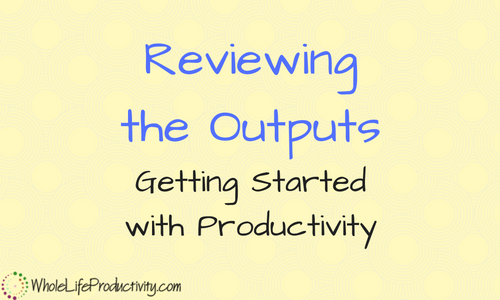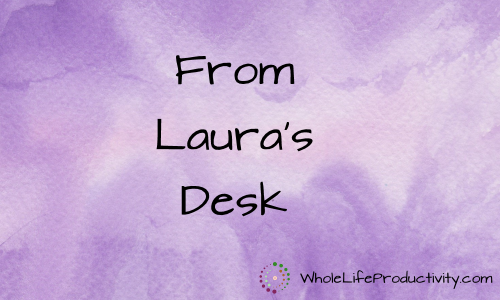
Reviewing the Outputs: Getting Started With Productivity
We’ve talked about inputs and outputs and how they relate to a productivity system. But when it is all boiled down, inputs and outputs are are just parts. It’s all about the doing…and knowing what to do when. That’s where reviewing the outputs comes into play. Productivity is all about keeping the most important things in front so that they don’t get lost in the urgent.
Since my memory is leaky, reviewing is the only way that I keep on track. I am a master at following rabbit trails, fooling myself that I am actually doing something valuable. Unless I have frequent reviews, I do not accomplish what I set out to do.
Urgent Vs. Important
I’m willing to guess that if you are at all concerned with productivity, you also realize that there are times when the things you really want to do get buried under the things that have to be done. This is the classic example of urgent vs. important.
Reviewing can make sure that you stay on task.
What Is A Review?
A review is simply looking at everything that is on your plate. It means that your system has to be up to date (all inputs turned into outputs), and that you are also aware of how your time is taken up.
Reviewing, in my opinion, also involves moving those tasks that you need and want to do into the immediate present. In other words, making a plan for how you are going to work.
Why Is The Review Important?
Reviewing is important because it lets you see not only what is on your calendar, but also what needs to be done. It allows you to evaluate each task in terms of urgency vs. importance, and figure out what you are going to do when.
Without these things in place, you will probably work on whatever is screaming the loudest…the urgent…and never get to what you consider truly important.
There will always be urgent tasks. The review allows you to carve out the time to do the important before attending to the urgent.
How To Do A Review
Doing a review consists of doing a repeatable set of actions.
Pick a Frequency
Some systems recommend that you do a weekly review. Some recommend daily. Some people need reviews more often to stay on track.
I believe you need to do it as often as you need…and that may change from day to day. However, you should always do at least a weekly review and a daily review.
The weekly time frame sets your week up. You’ll be able to see where your calendar is full, and adjust accordingly. You will be able to see where you have gaps where you can slot important work.
The daily review is also important because it sets the day up. You have a much better feel for where your time is going to go, and also be able to see unexpected urgent tasks that need to be taken care of immediately.
Turn Inputs Into Outputs
The first step in any review is to make sure all of your inputs have been processed. You need to have all your emails sorted, all the piles of paper looked at, and everything you need to do in your task system.
This prevents something from derailing your plan.
Think about this example: have you ever been humming along on your work only to be interrupted by an irate boss or client because you forgot to take care of an urgent task that came through your email?
Make sure you have a good list so that you have a true picture of everything that is on your plate.
Figure Out What Needs To Be Done
Next you will look at those things that need to be done.
I’m going to expose a fallacy of project management briefly here (I will do so in greater detail later this month)…
No matter how good you are at planning and managing your load, you will always have some urgent tasks.
Covey and Eisenhower have the matrix. And they talk about optimal performance. However, things happen. And no matter how good you are at this stuff, you are going to have stuff that needs to be done. And quickly.
So for this phase of the review, you are going to look for those things that need to be done right away. Things like the unexpected run to the craft store because your child forgot to tell you that he needed modeling clay for class tomorrow. Things like dealing with extra loads of laundry because someone in your house is ill. Or things like a rush order that came through at work. Figure out what is urgent and flag those items.
Figure Out The Important Tasks
Next up you need to figure out the important tasks. These are the things you can do to move you closer to the goals you want to achieve.
These are the tasks that lead to long-term improvement. These are the tasks that lead to the fulfillment of the life-long dreams. These are the tasks that lead to the stars.
Oh, yes….one way you can recognize them are because they are rarely urgent.
Look at Your Empty Spaces
Next look at your calendar. What time is already taken? And what time do you have free?
You can only work on your tasks during the time that hasn’t been committed to something else.
Some people recommend actually putting your tasks on your calendar so that your time is fully booked. Personally, that causes me to feel slightly panicky. So I don’t.
But I do look to see where I can fit things in.
Set Your Tasks
The last part of the review is to set those tasks you have identified, the urgent and the important, in an order that you can work on them during those blank spaces.
This of course will be dependent on where you are. For instance, if one of your tasks is to do the laundry before Mt. Washmore topples over and kills someone, you can’t do that if you are at work. (If you can, please let me know how you have accomplished that…) So you will have to filter the tasks based on the context of what you can do where.
A word of caution: do not put the urgent tasks first, telling yourself that you will get to the important ones. That will never happen. Put some of your important tasks first, like 2-3. Get them done, and then tackle Mt. Washmore.
Reviews are where you actually figure out what you can do when. They are an integral part of the whole productivity system, and should be attended to as often as you need.
Figure out the urgent, identify the important, look at your calendar and set your tasks. Repeat often.
Over to you: how often do you review? What do you include? Share below!




